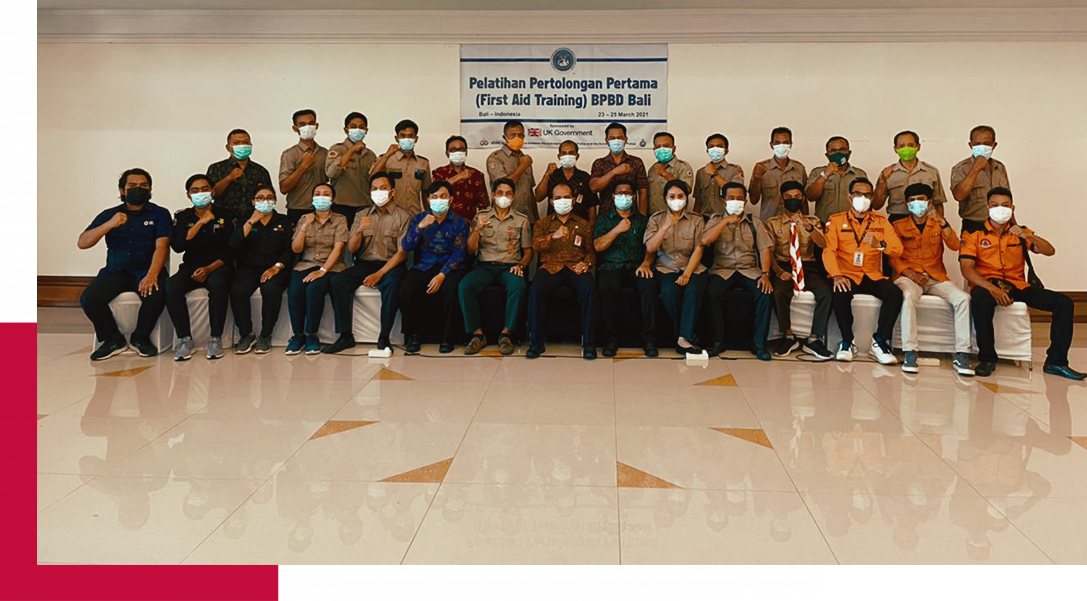Trauma first aid training for first responders
Project profile
Introduction
This project improved first responders’ ability to deliver first aid, should there be a terrorist attack in Indonesia, the Maldives or Philippines. By providing course participants with the required medical skills and equipment, as well as the training skills to pass this knowledge on to their colleagues, Siren assisted in making sustainable improvements first responders’ ability to save lives.
Background
Training was delivered across Indonesia, the Philippines and Maldives, between the period of November 2019 and February 2020. In the Maldives and Philippines, two courses were delivered: a Training Skills course and a First Aid course. The first course aimed to build basic training skills amongst two training cohorts; the second course’s objective was to provide them with First Aid skills in a wide range of topics, as well support the trainees in becoming effective trainers in those topics. In Indonesia, one course in Advanced First Aid was delivered, building on previous training skills and first aid courses that had been delivered to the cohort. The advanced course aimed to strengthen and expand existing capabilities.
Approach
The project built on Siren’s experience working with security agencies to deliver context-relevant, gender sensitive training that effectively develops their capabilities to better respond to terrorist incidents. In collaboration with the experts responsible for conducting the training sessions, Siren carried out a training needs analysis, developed the course curricula and evaluated training delivery and results across the three countries.
Outcomes
A total of 28 individuals went through the Training Skills Course across in the Maldives and Philippines. Of these individuals, 46% stated that the course had increased their ability provide onward training to other first responders and potential first responders. Confidence levels were self-reported, and trainees often had high levels of initial confidence due to their current roles as first responders. First aid knowledge was also seen to increase across all three countries as a result of the First Aid and Advanced First Aid courses delivered to 37 individuals. Overall, pre/post tests indicated a 59% increase in first aid knowledge as a result of these courses; in the Philippines, knowledge gain was particularly significant, with a 110% increase. A total of 11 first responders in Indonesia were trained on Trauma/Advanced Trauma First Aid, with participants reporting at 25% increase in confidence as a result of the course.
Lessons learnt and best practices
Mixed trainee cohorts, comprising individuals with different skill levels and from different organisations (the military, the police, etc.), offered the potential for unintended positive impacts. This included the ability for stronger students to improve their mentoring skills by supporting their less advanced peers; the chance for less advanced peers to learn from those with more previous training; and improved interoperability between critical first aid services. This was particularly the case in the Philippines and Maldives.
The use of practical training exercises, adapted to trainee needs and carried out in real-world environments, were by far the most effective means for building confidence and expanding trainee knowledge. Major multi-casualty scenarios run by the trainers received extremely positive feedback from trainees. Siren’s ability to tailor training delivery to the different cohorts’ needs and effectively use training methods in an engaging way was a critical component of changing the perspective of trainees regarding the means and methods for delivering training.
The opportunity for students themselves to conduct trainings, and receive feedback from trainers while in country, was an important element in ensuring project impact but also in providing the students with the opportunity for advanced mentoring and feedback.
While women were confident and clear when tasked to present in front of their peers, it was noted during the training in Indonesia that, in small group exercises, they tended to defer to male colleagues and presented less. For this reason, the trainers deliberately planned periodic all-women small group exercises.
Geographic scope
Indonesia, Maldives, Philippines
Institutional partner
Date
November 2019 – March 2020
Point of contact
Made possible with support from the UK government








